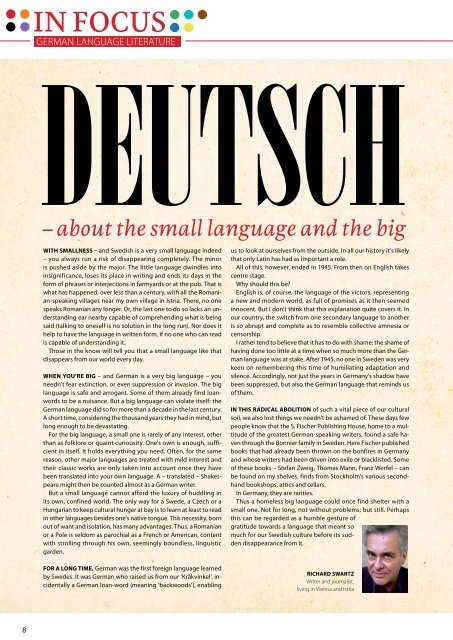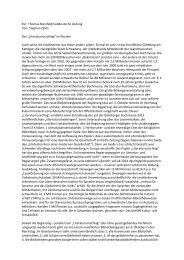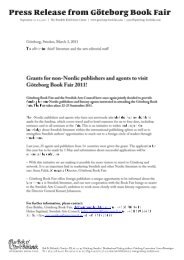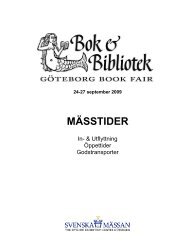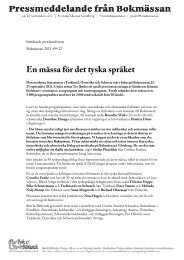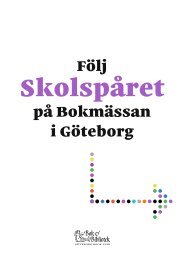PDF-document, 3,5 MB - Bok & Bibliotek
PDF-document, 3,5 MB - Bok & Bibliotek
PDF-document, 3,5 MB - Bok & Bibliotek
Create successful ePaper yourself
Turn your PDF publications into a flip-book with our unique Google optimized e-Paper software.
In FOcus<br />
German language literature<br />
Deutsch<br />
– about the small language and the big<br />
With smallness – and Swedish is a very small language indeed<br />
– you always run a risk of disappearing completely. The minor<br />
is pushed aside by the major. The little language dwindles into<br />
insignificance, loses its place in writing and ends its days in the<br />
form of phrases or interjections in farmyards or at the pub. That is<br />
what has happened, over less than a century, with all the Romanian-speaking<br />
villages near my own village in Istria. There, no one<br />
speaks Romanian any longer. Or, the last one to do so lacks an understanding<br />
ear nearby capable of comprehending what is being<br />
said (talking to oneself is no solution in the long run). Nor does it<br />
help to have the language in written form, if no one who can read<br />
is capable of understanding it.<br />
Those in the know will tell you that a small language like that<br />
disappears from our world every day.<br />
When you're big – and German is a very big language – you<br />
needn't fear extinction, or even suppression or invasion. The big<br />
language is safe and arrogant. Some of them already find loanwords<br />
to be a nuisance. But a big language can violate itself: the<br />
German language did so for more than a decade in the last century.<br />
A short time, considering the thousand years they had in mind, but<br />
long enough to be devastating.<br />
For the big language, a small one is rarely of any interest, other<br />
than as folklore or quaint curiousity. One's own is enough, sufficient<br />
in itself. It holds everything you need. Often, for the same<br />
reason, other major languages are treated with mild interest and<br />
their classic works are only taken into account once they have<br />
been translated into your own language. A – translated – Shakespeare<br />
might then be counted almost as a German writer.<br />
But a small language cannot afford the luxury of huddling in<br />
its own, confined world. The only way for a Swede, a Czech or a<br />
Hungarian to keep cultural hunger at bay is to learn at least to read<br />
in other languages besides one's native tongue. This necessity, born<br />
out of want and isolation, has many advantages. Thus, a Romanian<br />
or a Pole is seldom as parochial as a French or American, content<br />
with strolling through his own, seemingly boundless, linguistic<br />
garden.<br />
us to look at ourselves from the outside. In all our history it's likely<br />
that only Latin has had as important a role.<br />
All of this, however, ended in 1945. From then on English takes<br />
centre stage.<br />
Why should this be<br />
English is, of course, the language of the victors, representing<br />
a new and modern world, as full of promises as it then seemed<br />
innocent. But I don't think that this explanation quite covers it. In<br />
our country, the switch from one secondary language to another<br />
is so abrupt and complete as to resemble collective amnesia or<br />
censorship.<br />
I rather tend to believe that it has to do with shame; the shame of<br />
having done too little at a time when so much more than the German<br />
language was at stake. After 1945, no one in Sweden was very<br />
keen on remembering this time of humiliating adaptation and<br />
silence. Accordingly, not just the years in Germany's shadow have<br />
been suppressed, but also the German language that reminds us<br />
of them.<br />
In this radical abolition of such a vital piece of our cultural<br />
soil, we also lost things we needn't be ashamed of. These days few<br />
people know that the S. Fischer Publishing House, home to a multitude<br />
of the greatest German-speaking writers, found a safe haven<br />
through the Bonnier family in Sweden. Here Fischer published<br />
books that had already been thrown on the bonfires in Germany<br />
and whose writers had been driven into exile or blacklisted. Some<br />
of these books – Stefan Zweig, Thomas Mann, Franz Werfel – can<br />
be found on my shelves, finds from Stockholm's various secondhand<br />
bookshops, attics and cellars.<br />
In Germany, they are rarities.<br />
Thus a homeless big language could once find shelter with a<br />
small one. Not for long, not without problems; but still. Perhaps<br />
this can be regarded as a humble gesture of<br />
gratitude towards a language that meant so<br />
much for our Swedish culture before its sudden<br />
disappearance from it.<br />
For a long time, German was the first foreign language learned<br />
by Swedes. It was German who raised us from our ‘Kråkvinkel’, incidentally<br />
a German loan-word (meaning ‘backwoods’), enabling<br />
Richard Swartz<br />
Writer and journalist,<br />
living in Vienna and Istria<br />
8


